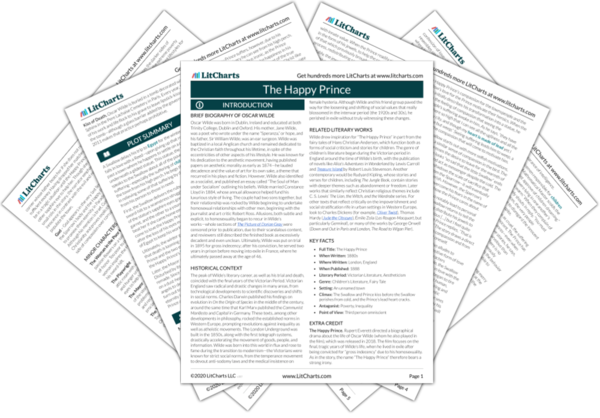Although this story is set in an unknown city in the northwest of Europe (likely London), the Swallow’s desire to migrate to Egypt and his many stories about the country turn it into a powerful and evocative symbol of shallow, fleeting pleasure. The Swallow describes Egypt using rich imagery, noting “the yellow lions” with their “eyes like green beryls,” as well as “pink and white doves” cooing at the Temple of Baalbec and the “King of the Mountains of the Moon, who is as black as ebony, and worships a large crystal.” The Swallow uses this exotic imagery to contrast Egypt with the privation, cold, and dirtiness he sees in this European city. It should be noted that these images are consistently racializing and othering, as they treat Egypt as a setting symbolic for its beautiful natural resources and alien religious tradition as opposed to an equivalent civilization.
However, this imagery represents the force of the Swallow’s desire to live for himself and for pleasure—Egypt does not exist as a place for him, but rather a series of aesthetic or artistic images that can bring pure pleasure. As the Prince criticizes the connection between pleasure and happiness and dismisses these marvels as less powerful than human misery, Egypt comes to represent a pleasure-seeking mindset that blinds one to what truly bears importance in the world, just as the Palace of Sans-Souci blinded the Prince during his lifetime, because “everything about [him] was so beautiful.” The Prince’s ambivalence towards pleasure colors any interpretation of the Swallow’s magnificent stories about Egypt—what seems on the surface to be a positive description turns out to be dangerously superficial. Egypt thus further represents escape from one’s own local context and the possibility of perpetuating in ignorance. As the Swallow’s flock had already migrated there, it also stands for collective decisions and a group mentality—even peer pressure—rather than individualism.
Egypt Quotes in The Happy Prince
"l am waited for in Egypt," answered the Swallow. "Tomorrow my friends will fly up to the Second Cataract. The river-horse couches there among the bulrushes, and on a great granite throne sits the God Memnon. All night long he watches the stars, and when the morning star shines he utters one cry of joy, and then he is silent. At noon the yellow lions come down to the water's edge to drink. They have eyes like green beryls, and their roar is louder than the roar of the cataract."

Unlock explanations and citation info for this and every other The Happy Prince quote.
Plus so much more...
Get LitCharts A+But at last he knew that he was going to die. He had just strength to fly up to the Prince's shoulder once more. “Good-bye, dear Prince!" he murmured, "will you let me kiss your hand?" "l am glad that you are going to Egypt at last, little Swallow," said the Prince, “You have stayed too long here; but
you must kiss me on the lips, for I love you."












